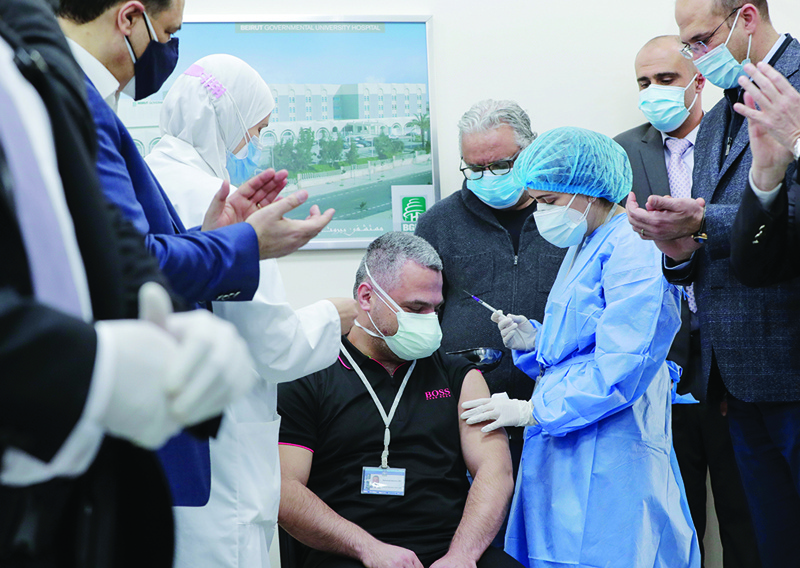 BEIRUT: Head of the ICU at Rafiq Hariri Hospital Mahmoud Hassoun receives the first jab of the COVID-19 Pfizer/BioNTech vaccine at the hospital yesterday. - AFP
BEIRUT: Head of the ICU at Rafiq Hariri Hospital Mahmoud Hassoun receives the first jab of the COVID-19 Pfizer/BioNTech vaccine at the hospital yesterday. - AFPBEIRUT: Lebanon yesterday gave its first COVID-19 vaccines dose to a doctor and an elderly actor, as it started an inoculation drive it hopes will keep the pandemic in check amid deepening economic crisis. Mahmoud Hassoun, the head of the intensive care unit at the key Rafiq Hariri Hospital battling coronavirus, was the first person to get the jab, an AFP correspondent said. "Hopefully this will be the start of the end of this plague in the country," Hassoun told AFP.
He received a Pfizer/BioNTech vaccine, a day after the very first 28,500 doses landed at Beirut's airport. Healthcare workers and those aged over 75 were the first to receive Pfizer/BioNTech shots at three major Beirut hospitals under the national rollout plan. Popular Lebanese comedian Salah Tizani, 93, who is best known by his stage name Abu Salim, was second to roll up his shirt in front of the cameras. "I'm telling everyone to come and get vaccinated and not be scared. Better to get vaccinated than to be knocked down by this deadly virus," he told AFP.
"Finally there's a glimpse of hope that things will get back to normal," said medical student Dana Chatila, who was waiting in her white lab coat and mask outside the American University Medical Center where she works in the emergency department. "It's going to take time of course, but the darkness is ending."
From today, another 18 hospitals across the country are to join in the vaccination campaign, health ministry adviser Mohamad Haidar has said. The World Bank has allocated $34 million to inoculate two million of Lebanon's six million inhabitants. Lebanon has been under a lockdown since mid-January, after an unprecedented spike in cases blamed on holiday gatherings that forced overwhelmed hospitals to turn away patients for lack of beds.
The pandemic has compounded the woes of Lebanese, already struggling with a dire economic crisis and reeling from a devastating explosion at Beirut's port last summer that killed more than 200 people, injured thousands and destroyed swathes of the capital. The Lebanese pound has lost more than 80 percent of its value to the dollar on the black market, prices have soared, and many have seen their savings trapped in the banks.
More than half the population lives in poverty, and rights groups have warned millions would struggle to survive without help if coronavirus restrictions lasted too long. The World Bank and the International Federation of Red Cross and Red Crescent Societies (IFRC) are to monitor the vaccine rollout.
Some 450,000 people have signed up to be vaccinated in Lebanon including 45,000 aged over 75 and 17,500 staff from the health sector, caretaker health minister Hamad Hassan has said. He has promised all residents would be vaccinated, including Syrian and Palestinian refugees living in the country. Firass Abiad, the head of the Rafiq Hariri Hospital, said Saturday that a first jab was "the best gift one can ask for on Valentine's Day".
But many in Lebanon are still hesitant to get the jab. Of 500 people surveyed by private think-tank Information International, 31 percent said they would get vaccinated, 38 percent said they would rather not and another 31 percent were undecided. Lebanon has ordered around six million vaccine doses in total, including two million from Pfizer/BioNTech and another 2.7 million via the international Covax distribution program.
The authorities say 336,992 people have caught coronavirus since Feb 2020, of whom 3,961 have died. The country's government stepped down after the Aug 4 port blast but remains in a caretaker capacity as a deeply divided political class has since failed to agree on a new cabinet. Lebanon desperately needs international aid, but donors have conditioned financial help on an independent government enacting sweeping reforms.
Saad Hariri, who returned as premier designate in October almost a year after he stepped down under street pressure, said he wanted a "government of experts not affiliated with political parties". "Whoever prevents the government from being formed prevents reforms from being launched, delays stemming the collapse... and prolongs the suffering of Lebanese," he said after weeks in which he and President Michel Aoun have blamed each other for the deadlock. He spoke on the 16th anniversary of the assassination in Beirut of his father, former premier Rafiq Hariri. - AFP









